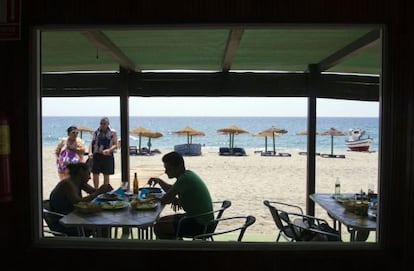Spain’s beaches: open for business
New legislation gets softer on protecting the shoreline

The center-right Popular Party (PP) has always made a point of defending chiringuitos – beach bars that open during the summer season – and it looks like the new coast law will bring yet more improvements to the sector.
Draft regulations to which EL PAÍS has had access talk about letting some chiringuitos take up twice as much surface area as they are currently allowed to do, and move closer to one another.
The document is part of a new law that purports to protect the coastline through sustainable activities, yet has been widely criticized for doing just the opposite: it allows all existing construction to remain standing, regardless of its legal status, and issues even more licenses to build.
The secretary of state for the environment, Federico Ramos, captured the essence of the law with the following sentence: “Whatever impact has already been done, let us make the most of it.”
Whatever impact has already been done, let us make the most of it”
The new regulations developing the Coast Law make a distinction between urban beaches and natural beaches. In the latter, beach bars will have a maximum surface area of 70 square meters and be made entirely of collapsible elements. The minimum distance between chiringuitos will be 300 meters.
But urban chiringuitos will be allowed to take up 300 square meters, up from 150, and stand no more than 75 meters from one another if their activities are “dissimilar.”
Urban beaches will also be allowed to host public events “with a tourism impact,” including all kinds of sports and cultural events as long as they have “national or international impact.” Licenses will be granted by local authorities after securing a favorable report from the regional government. Visual or audio advertising, which used to be banned, will be allowed in exceptional cases for authorized leisure and sports activities.
Under the new regulations, two types of sand dune will remain outside the public domain – the category that encompasses the beaches and affords the highest protection. This is because these dunes are not considered “necessary to guarantee the stability of the coast.” These criteria could open the door for building residential estates and hotel complexes in dune areas such as Valdevaqueros (Tarifa), several experts agreed.
The minimum distance between chiringuitos will be 300 meters
The government is also proposing to take new measurements of the Spanish coastline, with the goal of making the protected beach area narrower and giving homeowners right on the border between the public and private domains new rights to carry out work on their properties. Experts including administrative law professors, engineers and geographers have questioned the criteria and the scientific basis for new measurements that would shrink the public domain, not expand it – which would seem more logical considering the recent examples of coastal destruction wrought by storms in northern Spain.
Soledad Becerril, the Ombudswoman, has asked the government to make coastal protection a priority and insisted that the public domain must be determined on the exclusive basis of “physical and scientific criteria, and none of any other nature.”
The Coast Law also backtracks on the previous Socialist government's attempt to undo the worst excesses of the construction boom by declaring homes on the shoreline illegal and unfit for sales transactions. Now, these homes may be sold again. As for those standing right behind the beach line, the ban on structural reforms has been lifted, allowing owners to make the alterations they see fit as long as they get permits for the work.
The government estimates that over 500,000 people will benefit from the new legislation, which went into effect in July.
Tu suscripción se está usando en otro dispositivo
¿Quieres añadir otro usuario a tu suscripción?
Si continúas leyendo en este dispositivo, no se podrá leer en el otro.
FlechaTu suscripción se está usando en otro dispositivo y solo puedes acceder a EL PAÍS desde un dispositivo a la vez.
Si quieres compartir tu cuenta, cambia tu suscripción a la modalidad Premium, así podrás añadir otro usuario. Cada uno accederá con su propia cuenta de email, lo que os permitirá personalizar vuestra experiencia en EL PAÍS.
¿Tienes una suscripción de empresa? Accede aquí para contratar más cuentas.
En el caso de no saber quién está usando tu cuenta, te recomendamos cambiar tu contraseña aquí.
Si decides continuar compartiendo tu cuenta, este mensaje se mostrará en tu dispositivo y en el de la otra persona que está usando tu cuenta de forma indefinida, afectando a tu experiencia de lectura. Puedes consultar aquí los términos y condiciones de la suscripción digital.









































